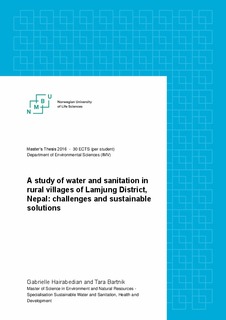A study of water and sanitation in rural villages of Lamjung District, Nepal : challenges and sustainable solutions
Master thesis

View/
Date
2016-08-11Metadata
Show full item recordCollections
- Master's theses (IMV) [130]
Abstract
Many people throughout the world still lack safe and affordable access to drinking water and basic sanitation. As of this year, only 83.3% and 53.1% of the population in Nepal will have ‘improved’ water resources and sanitation facilities, respectively. Improvements in water and sanitation infrastructure results in benefits to health, education and livelihoods. During March 2016, an investigation of the existing water and sanitation situation in Lamjung District was undertaken to understand the key issues facing the region. In total, 50 surveys were carried out in four different Village Development Committees (VDCs) across the district, working with the aid of four Peace Corps Volunteers (PCVs) and two Nepali interpreters. Simple Correspondence Analysis was conducted on all significant correlations to describe relationships between different variables. The results from our study were compared with findings from the 2011 National Population and Health Census, as well as other similar studies in Nepal, and this showed that Lamjung District generally has a better situation than other rural districts in Nepal with regard to access to water and sanitation. However, there were a range of issues found including insufficient quantity of water for domestic and agricultural use, poor accessibility and reliability of water sources, prevalence of waterborne diseases, a lack of protection and maintenance of water supply sources, low production of biogas, over-reliance on chemical fertilizers and inequality of access to water and sanitation between different socio-economic groups. Some of these issues were found to disproportionately affect marginalised groups such as the poor and members of lower castes, while some issues are more dependent on location and impact all groups regardless of their socio-economic status. By analysing the results and researching relevant literature, this thesis proposes sustainable solutions to all issues discovered. Concrete measures that could be implemented in Lamjung District are proposed, including implementation of sustainable low-cost technology to improve the quantity, quality, reliability and accessibility of water, and ecological sanitation systems which will have benefits both in reducing the spread of diseases and in improving crop yields through increased access to organic fertilizer made from human excreta and urine. These systems should be accompanied by better education, management and funding practices, which are also discussed.